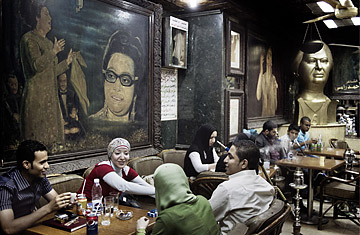
The young Egyptians gathered in this Cairo café are the kind of voters the Islamists covet
(3 of 3)
Can the liberals and the Islamists learn to play fairly with each other? The question is being asked not just in Cairo and Tunis but also in Damascus and Sana'a: if religious and secular groups can work together in Egypt and Tunisia, that would send a powerful message to Syria, Yemen and other Arab countries where revolutionary winds are blowing. Western governments, too, have a stake in the answer. Since the fall of Mubarak, much of the discussion in the U.S. and Europe has been about whether his successors can come to terms with the West and maintain peace with Israel. But the first and most important test of the new Arab democracy may be whether its conflicting political tendencies can accommodate each other.
Thus far, the Islamists have shown the greater willingness to deal, and the Obama Administration seems to think they can be expected to behave rationally, not like reactionaries or radicals. Secretary of State Hillary Clinton confirmed reports in late June that the Administration will upgrade its interaction with the Brotherhood from indirect communication — through Egyptian parliamentarians connected to the Islamists — to direct contact. But the Islamists' conciliatory gestures are not really directed at a Western audience. It's their own countrymen, Egyptians and Tunisians, they want to reassure. (It's remarkable how rarely the U.S. or Israel comes up in my conversations.)
The Islamists may have recognized that their radical tune is played out. They've seen in Iran and Gaza the crippling consequences of extremist behavior: Western aid and foreign investment would dry up and possibly be replaced by economic sanctions. As much as they desire power, the Islamists don't want to inherit bankrupt states.
It's also conceivable that they are playing for time to consolidate their position, although there are other plausible explanations. One is that the Arab revolution unshackled the moderate majority within Islamist groups. During the decades of oppressive rule, only the extremists dared speak out, allowing the rest of the world to believe they spoke for the entire movement. With their oppressors gone, moderate Islamists are now in the ascendancy within the Brotherhood. They vastly outnumber the extremists, and in the emerging democracy, this gives them power. They are setting the agenda.
Then there's the sobering prospect of having to run a government, perhaps as the dominant partner in a coalition. El-Erian looks positively gloomy as he ponders the challenges that await. "Jobs, where will they come from?" he says. "We need to create jobs. We need investments, not loans. We need businesses. We need to export more. If we work very hard, in five years Egypt will be a great market." In other words, this is no time to debate the finer points of Koranic jurisprudence.
There is yet one other factor influencing the Islamists to redefine themselves: the powerful political gravity of Tahrir Square. Islamists recognize that the revolution that liberated them was led by an iPad generation with universal, not religious, demands: jobs, justice, dignity. "The young people have told us all what they want, and our agenda should be close to theirs," says el-Erian.
As the Islamists stampede to the political center, there's still room for the outlier, the unreconstructed Salafi. I arrange to meet Abdelmajid Habibi at a café in Tunis. He's a leader of Hizb ut-Tahrir, an extremist group that has not yet been given license to operate as a political party. By coincidence, my Tunisian translator, Salma Mahfoudh, is also a woman; she is dressed in jeans and has her hair uncovered. Habibi is uncomfortable in her presence and keeps his eyes on me even as she speaks with him. It doesn't matter very much if he can't form a political party, he says, because he's not sure he approves of an election or a constitution. "Why do we need a constitution? We already have the Koran, which has all the laws we need as a society." He doesn't believe in modern borders or nations either: the entire Islamic world should submit to a single enlightened ruler.
This is the Salafi worldview I've encountered for nearly 15 years. But wait. As we talk some more, Habibi's line softens. "We think people can only be happy if they follow the Koran," he says. "But if they don't want it, we shouldn't force it on them." As he rises to say goodbye, he smiles at us both. He shakes my hand. And then Salma's.
